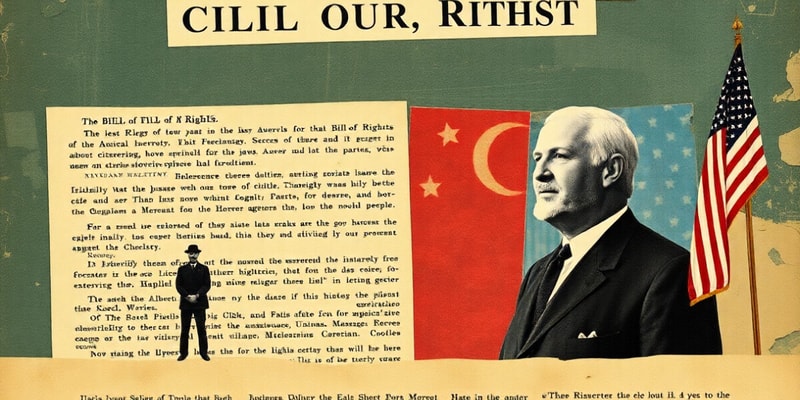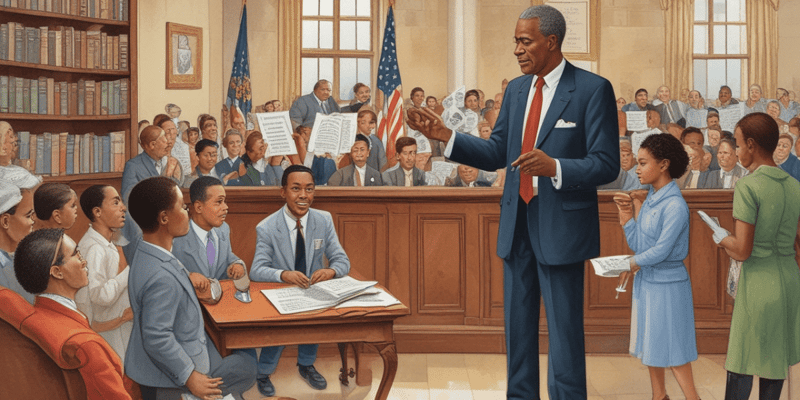Podcast Beta
Questions and Answers
Which of the following rights is NOT explicitly listed in the Bill of Rights?
What does the term 'civil liberties' refer to in the context of American rights?
What role did the government take in response to the failure to acknowledge natural rights of all people in America?
What was the primary concern of the Anti-Federalists regarding the new Constitution?
Signup and view all the answers
What did Alexander Hamilton suggest about the liberty of the press?
Signup and view all the answers
What does the term 'selective incorporation' refer to?
Signup and view all the answers
According to Patrick Henry, what was the purpose of a Bill of Rights?
Signup and view all the answers
What key principle does the 14th Amendment's clause about state law emphasize?
Signup and view all the answers
Which act prohibited discrimination based on several characteristics, including race and religion?
Signup and view all the answers
What was a major consequence of the Regents of the University of California v. Bakke ruling in 1978?
Signup and view all the answers
What is a common viewpoint expressed by those opposing a Bill of Rights?
Signup and view all the answers
How did the Voting Rights Act of 1965 aim to address discrimination?
Signup and view all the answers
What legal principle was established in the Fisher v. University of Texas case in 2016?
Signup and view all the answers
What does affirmative action aim to achieve?
Signup and view all the answers
Which amendment is associated with the right to remain silent during an interrogation?
Signup and view all the answers
What does the term 'Due Process Rights' primarily refer to?
Signup and view all the answers
How does the Constitution ensure that due process rights are upheld?
Signup and view all the answers
What historical context influenced the establishment of due process rights in America?
Signup and view all the answers
Study Notes
Civil Liberties and Rights
- American citizens are believed to have natural rights, which limit what the government can do, known as civil liberties.
- The government takes a proactive role in ensuring equal treatment for all, known as civil rights
Civil Liberties
- The Bill of Rights protects our civil liberties.
- The U.S. Bill of Rights was ratified on December 15, 1791.
- It contains the first ten amendments to the Constitution.
Thoughts on a Bill of Rights - Federalists
- Federalists did not believe a Bill of Rights was necessary because they felt the Constitution limited the government's ability to infringe on natural rights.
Thoughts on a Bill of Rights - Anti-Federalists
- Anti-Federalists did not trust the government and preferred to have a Bill of Rights added to prevent the new government from becoming too powerful.
The Bill of Rights & Incorporation
- The Bill of Rights originally only applied to the federal government.
- The 14th amendment led to the gradual application of parts of the Bill of Rights to the states through selective incorporation.
First Amendment & Religion
- The issue of guns is largely left up to states, as long as they are not outright banning them.
- The Supreme Court ruled that New York’s proper-cause requirement violates the Fourteenth Amendment in the case NYSRPA v. Bruen.
Due Process Rights
- Amendments 4-8 are known as due process rights, guaranteeing laws will be applied fairly to citizens suspected of breaking the law.
- Due Process prevents law enforcement from jailing, arresting, torturing, and imprisoning opponents without cause.
Court Cases
- Gideon v. Wainwright, 1963 determined that states must appoint attorneys for defendants who cannot afford legal representation.
- Miranda v. Arizona, 1966 established the requirement for law enforcement to advise suspects of their right to remain silent and obtain an attorney during police custody.
The Civil Rights Movement
- African Americans fought for civil rights in the 1950s and 1960s through various means: legal, political, economic, and civil disobedience.
Removing barriers to integration and ending the Jim Crow era
- The Civil Rights Act of 1964 prohibits discrimination on the basis of race, color, religion, sex or national origin.
- The Voting Rights Act of 1965 outlawed discriminatory voting practices in many Southern states, including literacy tests.
Affirmative Action
- Affirmative action refers to procedures designed to give preference to individuals from historically discriminated against groups, used in college applications and hiring procedures.
Court Cases
- Regents of the University of California v. Bakke, 1978, ruled that racial quota systems in government violate the Civil Rights Act of 1964.
- Fisher v. University of Texas, 2016, held that the University of Texas’ use of race as a consideration in admissions does not violate the Equal Protection Clause.
- Students for Fair Admissions (SFFA) v. Harvard, 2023, ruled that Harvard’s use of race in the admissions process violates the Equal Protection Clause.
When Civil Liberties Clash With Civil Rights
- Our rights can be limited when they clash with other people’s rights, or when they conflict with a collective good that society values.
- Masterpiece Cakeshop, Ltd. v. Colorado Civil Rights Commission 2018, held that the Colorado Civil Rights Commission's conduct in evaluating a cake shop owner's reasons for declining to make a wedding cake for a same-sex couple violated the Free Exercise Clause.
- Bostock v. Clayton County 2020, ruled that an employer who fires an individual employee merely for being gay or transgender violates Title VII of the Civil Rights Act of 1964.
What About Equality of the Sexes? An Amendment for Equality?
- The Equal Rights Amendment (ERA) was originally authored in 1923 by Alice Paul.
- Phyllis Schlafly became an outspoken opponent of the ERA in the 1970s.
Timeline of the ERA
- In 1972, the amendment passed both the House and the Senate and was sent to the states for ratification.
- 38 states needed to ratify within a 7-year time limit, but this did not occur.
- Congress extended the time limit by three years, but the amendment was still 3 states shy of 38.
- 5 states later rescinded their votes: Idaho, Kentucky, Nebraska, South Dakota, and Tennessee.
- Illinois ratified in 2017, followed by Nevada in 2018, and lastly Virginia in 2020.
Studying That Suits You
Use AI to generate personalized quizzes and flashcards to suit your learning preferences.
Related Documents
Description
This quiz explores the concepts of civil liberties and civil rights as understood in American politics. It summarizes the importance of the U.S. Bill of Rights and discusses the differing perspectives of Federalists and Anti-Federalists on its necessity. Test your knowledge on these foundational principles of American democracy.




